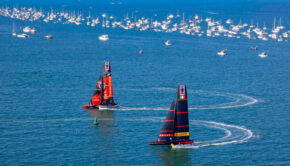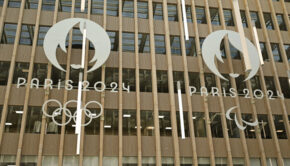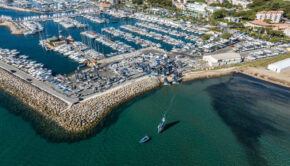Olympic groups to monitor Brazil’s polluted waters
Published on November 22nd, 2013
Olympic sports federations will be monitoring efforts to clean up the polluted waters around Rio de Janeiro to prevent health risks to athletes at the 2016 Games.
An Associated Press report this week showed nearly 70 percent of Rio’s sewage is untreated and dumped into iconic beach areas like Copacabana and Ipanema and picturesque Guanabara Bay. Those waters will host several of Rio’s events at the Olympics and Paralympics.
FINA, the world governing body of swimming, said Friday its sports medicine committee would check water conditions before the games.
“A test event will be conducted some months in advance, in the same waters and under the same conditions,” FINA said in a statement to the AP.
“On this occasion, the Rio 2016 organizing committee must present a certificate of water quality in accordance to Brazilian law.”
FINA’s marathon swimming event will be held off Copacabana. Those waters are also the venue for the swimming portion of the triathlon.
In bid documents, Rio organizers pledged to Olympic officials that the pollution would be cleaned up after decades of neglect and poor planning.
In data obtained by the AP, the measurement of fecal coliform bacteria in Copacabana went up 16 times above the Brazilian government’s satisfactory level as recently as three weeks ago.
The Rodrigo de Freitas, the venue for rowing and canoeing located in the heart of the city, experiences periodic fish die-offs that leave thousands floating in the briny lake.
Matt Smith, executive director of rowing’s world governing body, said Rio officials blame heavy rains and the city’s sewer system for the dead fish. Smith called the health risk to rowers “low” but cautioned about possible problems.
“We are working on contingency scenarios but if, for any reason, we have a massive rainfall just before or during the 2016 Games, we risk cancellation to ensure healthy conditions for the rowers,” he said in an email to AP.
Smith said the last four Olympic regattas had been held on artificial courses where water quality was easy to control. The last natural lake was 1996 in Atlanta, he said.
The most deeply rooted problem is Guanabara Bay, which will hold sailing events. The bay has become a polluted dump where few locals — except the poor from Rio’s neighboring slums — dare to swim.
“We’re for sure concerned about it, and we’re in discussion with the organizing committee about it,” said Jerome Pels, chief executive officer of sailing’s world governing body. “We know with reports we are getting from sailors who are training there — just from the visual view of the water — that already there are some concerns. … It’s on our radar.”
Rio organizers have been pressed by the International Olympic Committee to speed the pace of construction. Cleaning the water could add to delays in preparing for the games, which will cost about $15 billion in public and private money.
“Rio 2016 can guarantee beyond any doubt that no athlete, official or member of the Olympic family will be put at risk,” Rio organizers said in a statement to AP. “The health and welfare of the athletes is always our top priority.”
Rio organizers added that water quality was the responsibility of the state government.
“We trust that the authorities will deliver the conditions to enable the athletes to compete to the very best of their ability in 2016,” organizers added.
Source: Miami Herald – November 22, 2013









 We’ll keep your information safe.
We’ll keep your information safe.